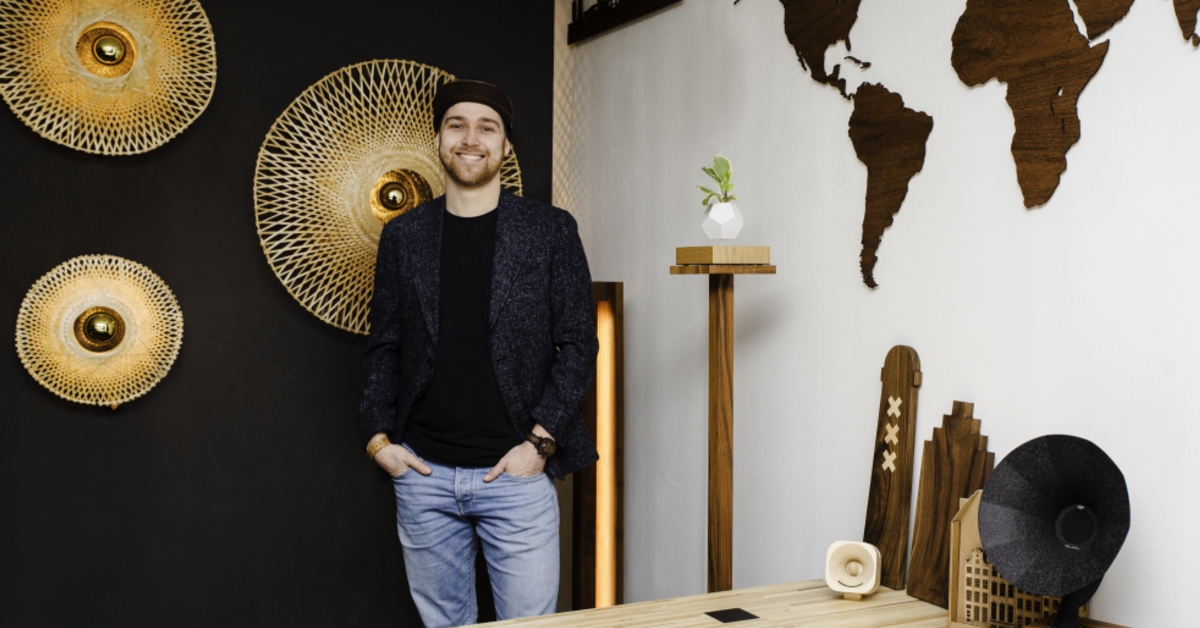Image credit: Wooden Amsterdam
The news of the outbreak of the coronavirus made entrepreneur of Wooden Amsterdam, Wieger Josemans, change course immediately. As the supplier of sustainable quality products had always relied on 70 per cent of the revenue coming from physical sales via retailers and wholesales, the switch in focus to e-commerce was inevitable. Last year Josemans managed to turn the numbers around; by changing strategies, 70 per cent of the revenue was generated by e-commerce, which has lead to an 85 per cent overall growth of the company.
Getting ready
The first step Josemans made was ensuring that the online team got to work full-time on optimizing the webshop. As the site was built by Josemans himself in 2016 and didn’t evolve with all the latest web-developments, this was easier said than done. Clear routing, a usability boost, higher speed, and the ability to handle large numbers of visitors: all crucial aspects to handle to ensure survival.
Investing to meet consumer needs
The next step that was taken to grow the online sales was analyzing the current situation, consumer needs and wishes and acting on it. After all, a good-looking and -working website is great, but when it doesn’t speak to the consumer it doesn’t generate any sales. The country being in lockdown, meant that everyone was spending time at home more than ever, and working from home even becoming the new standard. Hence, creating a space to still work as productive as possible and having a pleasant home environment became a priority. Wooden Amsterdam responded to this development by expanding its range of interior- and lifestyle items with products that contributed to achieving these goals for their customers: home office accessories and desks that can be used sitting down, as well as standing, were added, and the existing range of interior products such as atmospheric lamps and wall coverings were expanded. In short: Josemans invested in the opportunities that presented themselves.
From niche to (more) mainstream
Furthermore, he and his team brainstormed about also creating opportunities to widen their consumer base. As facemasks to protect the spread of the virus were in high demand, Josemans teamed up with influencer Carolien to design a sustainable collection of facemasks. This news was featured in the Dutch press and got lots of attention on social media, which lead to brand awareness amongst consumers who previously didn’t know the brand. The number of website visitors grew by no less than 700%, which brought along other benefits as well; by getting these consumers to the website, they 1) became acquainted with the other products of Wooden Amsterdam, 2) discovered Wooden Amsterdam’s focus on sustainability and quality that got many of them interested in more than only the facemasks, and 3) by adding a flyer to every mask that was shipped, showing a selection of the platform best sellers, they managed to get 5.3% of the buyers to return for a repeat purchase.
Strong stakeholder relationships to seize opportunities
A shift in strategy and a rapid expansion of products, of course, requires investment which is not that easy to get in times of uncertainty. These changes could only be achieved because of the strong ties between Josemans and his financiers and suppliers. By directly talking to all stakeholders when the pandemic hit, and being transparent about the goals, and expectations, Josemans ensured that the company was given the needed space and flexibility to keep up with external developments and create new opportunities. If Josemans had not invested in these relationships in the previous years, chances were that Wooden Amsterdam – like countless other companies – would have been hit (too) hard by the measurements taken by the government to minimalize the outbreak of the coronavirus.
With this built up trust, he was also able to secure a percentage of revenue from offline sales that otherwise had been lost. He negotiated a strategic deal to take over the Benelux distribution of the popular FLYTE collection, with a flexible installment arrangement. This risk he took in the volatile market, paid off. This deal meant that the dozens of big retailers – and their orders – that were initially contracted by the previous distributor, became clients of Wooden Amsterdam. Therefore, the number of offline sales was stabilized. In Q4-2020, they even realized the same numbers as the year before.
Where Josemans got flexibility, he also returned the favor. Smaller retailers of the company who were left with large stocks were given the option to exchange products or return them in full. As a result, their risk was significantly reduced, which will pay off when retailers are allowed to open their doors again.
Online marketing that fits the brand
In the years before the corona crisis, Josemans cut back on online budgets. The pandemic made this change around completely. Last year, Josemans used a large part of the revenue for online marketing and advertising. Facebook, Instagram, Pinterest, SEO, and SEA; all possible communication means were deployed, tested, optimized, and if necessary thrown overboard when it turned out that it did not resonate well enough. Wooden Amsterdam created the best mix of online marketing tools, that suited their specific brand. As their lifestyle items are mostly about the consumers’ experience, budgets were quickly redistributed to resources where visuals are the main source of advertising. When changing strategies, trial and error to optimize, are key.
So, does this successful switch mean that Josemans will retain sole focus on e-commerce whenever the pandemic comes to an end? The answer is no. Spreading the opportunities and sales channels is exactly what makes Wooden Amsterdam futureproof. In the event of losing offline sales, online sales can be relied upon, and vice versa. However, online sales will never fall back to second place. After all, this has enabled Wooden Amsterdam to exceed its expectations for 2020 and start 2021 the best way possible.









